The History of the British Government’s UFO Files (and How You Can Access Them)
Put away your tinfoil hats — everything you’re about to read regarding the British government and secret UFO files is entirely true. It’s just not as exciting as you’d expect it to be.
Though it might sound like a crazy conspiracy theory, there was a period of about 60 years where the British government was interested enough in UFOs to dedicate time and resources to exploring reports of unexplained sightings from the public. Records of ‘close encounters’ from civilians and military personnel were gathered by the Ministry of Defence (MoD) and kept locked away until twelve years ago when the documents were released to the public. Whether or not you believe we are alone in the universe, it’s clear from reading the MoD’s UFO files that the belief in extraterrestrial life is alive and well in the British public. So where did the government’s interests in UFOs begin, and what caused them to release these secretive documents to the public? And, most importantly, how can you legally access the UFO files from the comfort of home?
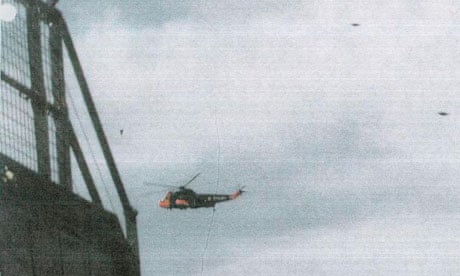
The Beginning of Government Funded UFO Investigation
In 1950 the Flying Saucer Working Party was formed by Sir Henry Tizard, Chief Scientific Adviser for the early Ministry of Defence. Tizard argued that scientific research should consider the subject of UFOs before dismissing them. Despite insistence that the subject be taken more seriously, in 1951 the Flying Saucer Working Party reported that most UFO sightings were hoaxes or misidentifications and research was no longer pursued.
The following summer, a wave of UFO sightings were reported around the world, with the United States alone reporting over 500 in July 1952. The Blue Book was launched by CIA director Major General Charles P. Cabell to investigate the influx of sightings, just in time for the 1952 Washington, D.C. UFO Incident. On 19-20 of July, unidentified blips appeared on the radars at Washington’s National Airport and Andrews Air Force Base, and again the following weekend. Searches above the airport and base failed to uncover what was causing the radar blips, which were moving at incredible speeds in sporadic patterns. Panic spread throughout the country and the Pentagon attempted to explain the source of the phenomena as hot weather and ‘temperature inversions’.
Across the ocean, Prime Minister Winston Churchill was observing the United States with curiosity, and on 28 July sent a memo to his Secretary of State of Air and scientific advisor asking “what does all this stuff about flying saucers amount to? What can it mean? What is the truth? Let me have a report at your convenience.”
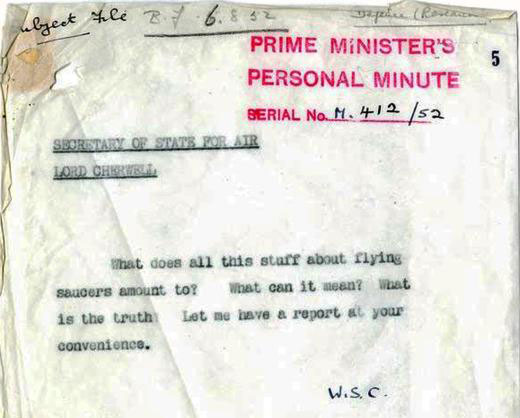
From the National Archives: Guest blog: UFO Desk – Closed
In September that year, a UFO was spotted by UK’s Royal Air Force (RAF) pilots and military personnel during a NATO exercise. Flight Lieutenant John Kilburn was among those who made a report, stating the movements of the UFO were “not identifiable with anything [he had] seen in the air and the rate of acceleration was unbelievable.” The object, according to Kilburn, appeared circular in shape and silver in colour, and at one point halted acceleration to stand in place while “rotating on it’s own axis.” Both the UK and the US saw an increase in reports of UFOs during the remainder of 1952, with fast-moving and unidentifiable blips continuing to make an appearance on RAF radars.
After the vast amount of reports in 1952, the MoD resumed UFO investigations in 1953. However, documents prior to 1967 were lost since records older than five years were routinely destroyed. But following an increase in public interest in UFOs, the MoD began retaining all documents pertaining to sightings after 1967. It wasn’t for a number of decades that some of these documents were made available to the public.
The Confusion Surrounding the MoD and their UFO Desk
The Ministry of Defence is a British government department that officially formed in 1964 after five Departments of State (the Admiralty, the War Office, the Air Ministry, the Ministry of Aviation, and the earlier version of the Ministry of Defence) were merged together. The purpose of the MoD is to implement defence policy, defend the United Kingdom, and strengthen international peace.
So it’s no surprise that the MoD was interested in UFOs, or as they saw it, unauthorised aircraft entering UK airspace. The MoD didn’t house a division of Men in Black, nor were they interested in investigating abductions or interdimensional time travellers. But if there was some sort of aircraft soaring unchecked through UK airspace (as was possibly the case in 1952), they were certainly interested in finding out who it was and why they were there.
The MoD accepted reports of UFOs from civilians as well as military personnel and police officers, which were examined before determining if there was an impending threat. And for a period of time, the public would receive a personal response from the MoD, which are among the documents now publicly available.
But it was clear the public was confused about the purpose of the MoD’s UFO Desk, which was ultimately concerned with the defence of airspace, not verifying the existence of extra-terrestrials. Nick Pope, who worked for the MoD for 21 years and the UFO division from 1991 to 1994, wrote in a BBC article that “while the MoD investigations were aimed at determining whether there was evidence of any threat, we were thinking more about Russians than Martians.”
The End of an Era: The Closure of the UFO Desk and Release of the MoD’s Files
In 2008, the first batch of files from the UFO Desk were uploaded to the National Archives’ website after an immense number of Freedom of Information Act requests from curious UFO hobbyists and conspiracy theorists overwhelmed the department. That year, Pope told The Guardian “they are sinking in a sea of FOI requests on UFOs. The administrative burden in dealing with them on a case by case basis is horrendous.” The incredible amount of Freedom of Information requests can be seen in the documents released (see below) and it’s clear that the high volume of demands were taking up more time and resources than it was worth.
The Ministry of Defence stepped back from their involvement with UFO reports in 2009 due to this continued stress on resources as well as the fact that that the program wasn’t actually serving any defence purpose. A press release from The National Archives highlights the alarming increase of correspondence in 2009, which saw 600 UFO reports in the UK that year, three times the reports made in 2008. And according to the press release, Defence Minister Bob Ainsworth was informed that in over 50 years “no UFO sighting reported to [MoD] has ever revealed anything to suggest an extra-terrestrial presence or military threat to the UK.” It was concluded that the work required to read through and respond to all the reports was simply not worth it. And so in the end, the files were uploaded onto the National Archives to allow the public to sift through the reports themselves.
A few examples of some of the stranger types of correspondence made during the UFO desk’s final yaer:
- An Australian ‘ufologist’ who said they’d spoken with a former official in the UK Ministry of Defence who felt UFO sightings needed to be more thoroughly investigated, and that the ufologist wished to speak with the Secretary or the head of the Royal Air Force over the phone. He wrote, “whilst I do have much respect for what the Royal Air Force accomplishes for the United Kingdom, as a Ufologist I cannot in good conscious allow the RAF and the MoD to continue not to properly study and investigate Unidentified Flying Objects. There is a high possibility that a majority of these still resolved reports are extraterrestrial. I know that the Royal Air Force and MoD usually send ‘standard’ letters assuring your civilians that enquire regarding UFO activity to try and lead them astray from the truth.” He concludes his letter with “You must investigate the threat of extraterrestrial UFOs. Act now.” [Reference: DEFE 24/2451/1]
- An individual who claimed to have a device for shooting down UFOs: “I would like to request information regarding the many letters I have sent to the Secretary of State for Defence Rt John Hutton regarding my theory on how the Unidentified Flying Objects that are frequently sighted in the UK, can be shot down using a device which the Secretary could find greatly interesting, yet every time my letters are forward to another department in the MoD?” [Reference: DEFE 24/2451/1]
- An author working on a book requesting a hypothetical response to his detailed fictional scenarios, which included how the MoD would deal with a time traveller and ‘an alien life-form masquerading as a human’. The MoD responded that “the MoD has no regulations or standing procedures relating to these matters and it would not be appropriate for me to speculate on these issues“. [Reference: DEFE 24/2451/1]
- A UFO investigator offering their services to the UFO Desk: “I am writing to you because I have a desire to offer my services in any way possible to the ‘UFO Desk’. I am a very UFO investigator myself and have spent 5 years researching the ‘Roswell Incident’. however, I feel that focusing my mind on reports here in England, I would have greater intelligence at hand.” [Reference: DEFE 24/2451/1]
- An induvial who initially emailed the MoD to repot a UFO sighting who then emailed again to ask what qualifications were needed to become an astronomer. [Reference: DEFE 24/2451/1]
Below are a few additional, visual examples of the types of reports the MoD was receiving in 2009:
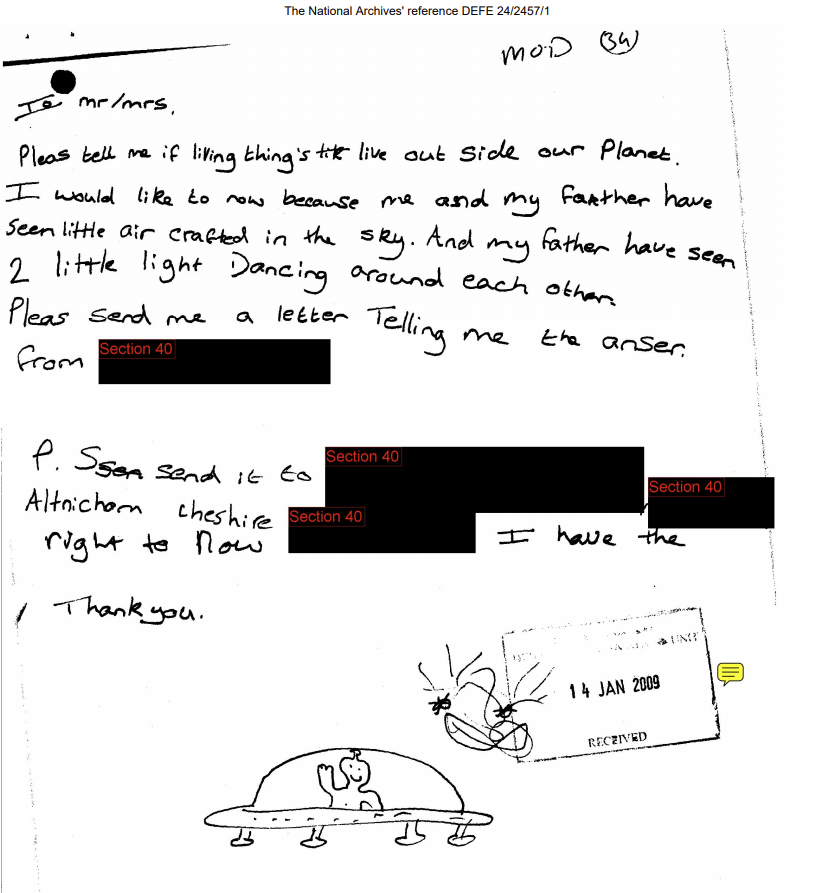
The National Archives’ reference DEFE 24/2457/1.
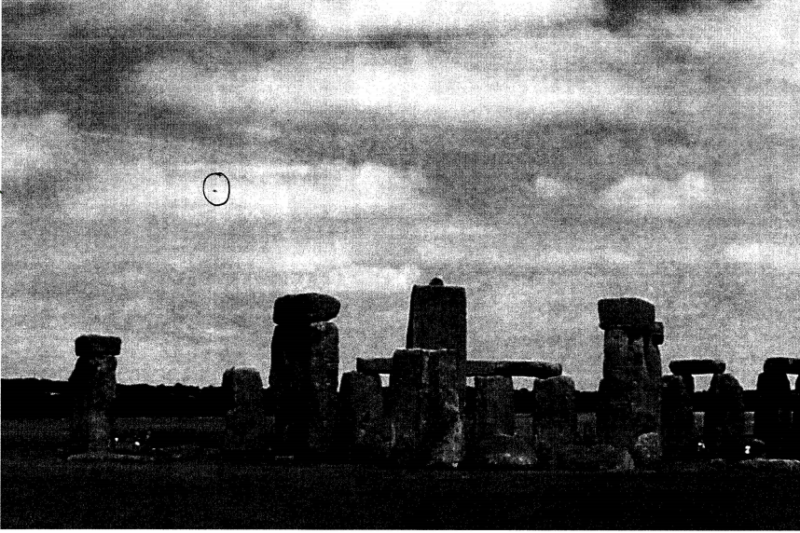
The National Archives’ reference DEFE 24/2451/1
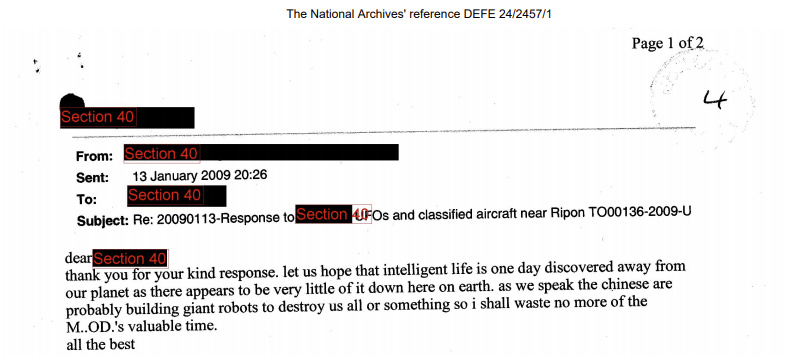
The National Archives’ reference DEFE 24/2457/1
With everything now out in the open, it’s clear that the UFO desk was serving little purpose and possibly only fuelling paranoid delusions and government conspiracies.
Accessing the MOD’s UFO Files
The files referenced above are available through the UK government’s website as well as The National Archives. The following explains how to access these files and the types of information they contain. Be sure to set aside an ample amount of time for reading — there is a LOT to go through!
British Government Website
The Ministry of Defence’s UFO reports from 1997 to 2009 are available for download from the British government’s website. The reports are split into individual PDFs by year and contain a lengthy list of UFO sightings with the location, time and date, and a brief description of each event. If the individual’s occupation was deemed relevant, this was also recorded (primarily police officers, military personnel, air traffic controllers, etc.).
These reports can be accessed at www.gov.uk
The National Archives
The National Archives holds the MoD’s UFO correspondence with the public, including Freedom of Information requests, from the two final years of the UFO Desk (2007-2009), and other documents of interest. Each collection of documents are free to download with a free National Archives account. If you choose not to make an account, there is a small fee. Once downloaded, you have access to the PDFs for 30 days. For the sake of The National Archives’ servers, up to 10 documents can be ordered at a time and a maximum of 100 per 30 days. These PDFs are incredibly fun to read through and include email correspondence, UFO reports, drawings, photographs, and newspaper articles that the public sent the MoD over the two year period.
A notable highlight of the UFO files is the collection of documents pertaining to the infamous Rendlesham Forest Incident at the end of 1980, which saw one of the UKs most famous and unexplained UFO sighting at RAF Woodbridge.
These documents can be accessed at www.nationalarchives.gov.uk/ufos
So Are We Alone in the Universe?
The conclusion from the MoD was that they don’t know and don’t really care. Which is fair enough considering their purpose of defending the country from terrestrial, as opposed to extra-terrestrial, threats. So while the UFO desk documents won’t shed any light on the ‘truth’ behind aliens, they’re an interesting look into the types of things people believe and how the UFO craze has never really died down. And who knows, maybe one of the reports in the UFO files really did describe an actual visitor from another galaxy. Make a cup of tea, cuddle up with some blankets, and take a read through the thousands of pages to decide for yourself!
Sources and Additional Reading
BBC: My time as a UFO investigator for the government (2016)
BBC: MoD UFO desk closed because it served ‘no defence purpose’ (2013)
Excerpt: The UFO Files: The Inside Story of Real-Life Sightings by David Clarke
National Archives: Unidentified Flying Objects (UFOs)
National Archives: UFO Desk Closed
The Guardian: Is there anybody out there? How the men from the ministry hid the hunt for UFOs
BBC: Ministry of Defence files on UFO sightings released
The Guardian: Latest release of ‘X-files’ shows MoD took idea of alien visitors seriously
The Guardian: The truth is out there: National Archives lifts lid on UFO files
